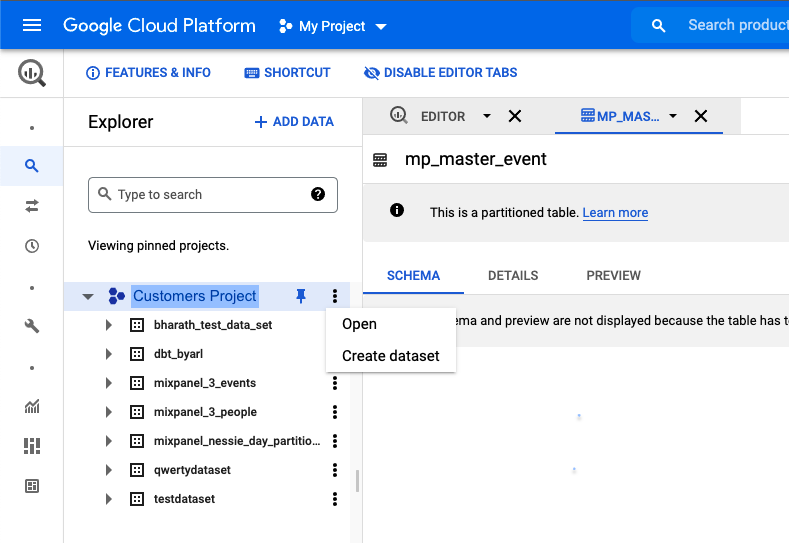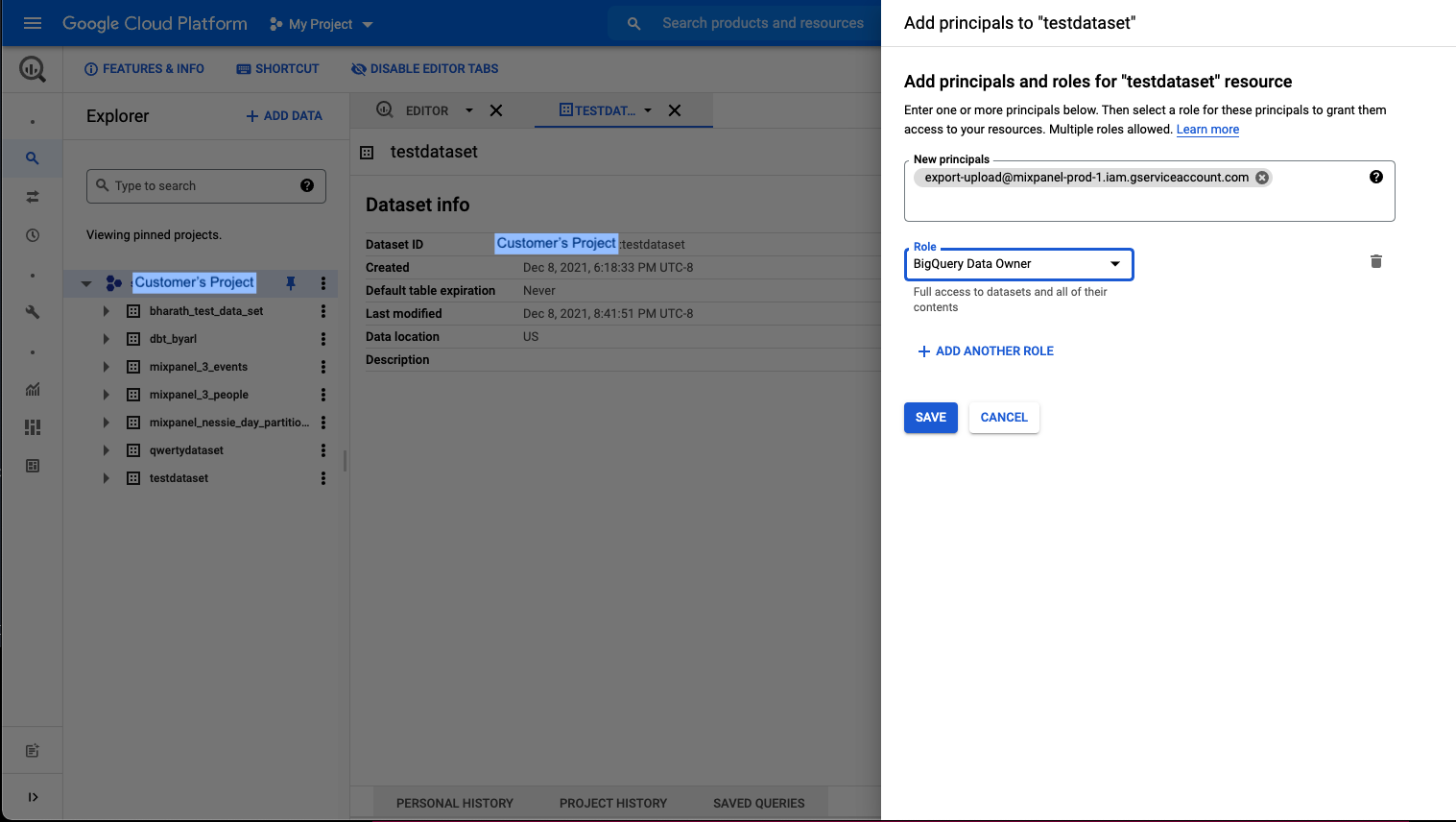Schematized BigQuery Pipeline
Customers on an Enterprise or Growth plan can access Data Pipeline as an add-on package. See our pricing page for more details.
This guide describes how Mixpanel exports your data to a Google BigQuery dataset.
Design
There are currently two ways to export mixpanel data into BigQuery.
- Exporting into Customer managed BigQuery (recommended)
- Exporting into Mixpanel managed BigQuery

As part of the export pipeline, a new dataset mixpanel_nessie_day_partitioned_<PROJECT_ID> will be created if the customer chose to export into Mixpanel managed BigQuery or a dataset should be created with appropriate permissions on customer-managed BigQuery and provide us with a name. We also apply transformation rules to make the data compatible with data warehouses.
For user profile and identity mappings tables, we create a new table with a random suffix every time and then will update the mp_people and mp_identity_mappings views accordingly to use the latest table. You should always use the views and should refrain from using the actual tables as we don’t delete the old tables immediately and you may be using an old table.
Important: Please do not modify the schema of bigquery tables generated by Mixpanel. Altering the table schema can cause the pipeline to fail to export due to schema mismatches.
Partitioning
The data in the tables is partitioned based on _PARTITIONTIME pseudo column and in project timezone.
Note: TIMEPARTITIONING shouldn’t be updated on the table. It will fail your export jobs. Create a new table/view from this table for custom partitioning.
Queries
You can query data with a single table schema or with a multiple table schema in BigQuery. To get more information about the table schemas, please see Schema.
To query a single table schema, use this snippet.
SELECT count(*)
FROM mixpanel_nessie_day_partitioned_<PROJECT_ID>.mp_master_event
WHERE mp_event_name = “<CLEANED_EVENT_NAME>”To query a multiple table schema, use this snippet.
SELECT count(*)
FROM mixpanel_nessie_day_partitioned_<PROJECT_ID>.<CLEANED_EVENT_NAME>CLEANED_EVENT_NAME is the transformed event name based on transformation rules.
Getting the number of events in each day
You will need this if you suspect the export process is not exporting all the events you want. As the tables are partitions using _PARTITIONTIME pseudo column and in project timezone, you can use to following query to get the number of events per day in an easy and fast way:
SELECT
_PARTITIONTIME AS pt,
COUNT(*)
FROM
`mixpanel_nessie_day_partitioned_<PROJECT_ID>.mp_master_event`
WHERE
DATE(_PARTITIONTIME) <= "2021-12-03"
AND DATE(_PARTITIONTIME) >= "2021-12-01"
GROUP BY
ptThis example returns the number of events in each day in project timezone for a monoschema export pipeline and an example date range. You can adjust the query for multischema by putting the right table name in the query.
Querying the identity mapping table
When using the ID mappings table, you should use the resolved distinct_id in place of the non-resolved distinct_id whenever present. If there is no resolved distinct_id, you can then use the distinct_id from the existing people or events table.
Below is an example SQL query that references the ID mapping table to count number of events in a specific date range for each unique user in San Francisco :
SELECT
CASE
WHEN m.resolved_distinct_id IS NOT NULL THEN m.resolved_distinct_id
WHEN m.resolved_distinct_id IS NULL THEN e.distinct_id
END as resolved_distinct_id,
COUNT(*) AS count
FROM mixpanel_nessie_day_partitioned_<PROJECT_ID>.mp_master_event e FULL OUTER JOIN mixpanel_nessie_day_partitioned_<PROJECT_ID>.mp_identity_mappings_data_view m
ON e.distinct_id = m.distinct_id
AND mp_city="San Francisco"
AND DATE(e._PARTITIONTIME) <= "2021-12-03"
AND DATE(e._PARTITIONTIME) >= "2021-12-01"
GROUP BY resolved_distinct_id
LIMIT 100Counting number of times a user has done a specific behavior is also possible by adding more filters on event properties. You can adjust the query for multischema by putting the right table name in the query.
Exporting into Customer managed BigQuery (Recommended)
We recommend exporting Mixpanel data into customer-managed BigQuery, for this the customer needs to follow these steps.
-
Create a dataset in their BigQuery

-
Give Mixpanel the necessary permissions to export into this dataset.
Note: If your organization uses domain restriction constraint you will have to update the policy to allow Mixpanel domain
mixpanel.comand Google Workspace customer ID:C00m5wrjz.We need two permissions to manage the dataset.
BigQuery Job User
- Go to IAM &Admin in your Google Cloud Console.
- Click + ADD to add principals
- Add new principal “export-upload@mixpanel-prod-1.iam.gserviceaccount.com” and set role as “BigQuery Job User”, and save.

BigQuery Data Owner
- Go to BigQuery in your Google cloud Console.
- Open the dataset you want mixpanel to export to.
- Click on sharing and permissions in the drop down.
- In the Data Permissions window click on Add Principal
- Add new principal “export-upload@mixpanel-prod-1.iam.gserviceaccount.com” and set role as “BigQuery Data Owner”, and save.

-
You need to pass this dataset and gcp project id as params when you create your pipeline
Exporting into Mixpanel managed BigQuery
This is not a recommended approach anymore. But if you choose to export into Mixpanel managed BigQuery then you must provide a Google group email address to use the BigQuery export when you create your pipeline. Mixpanel exports transformed data into BigQuery at a specified interval.
Note: Mixpanel creates a dataset in its own BigQuery instance and gives “View” access to the account(s) provided at the time of creating the pipeline. As a result, there is no storage cost associated with exporting data to BigQuery, but standard compute costs will occur when querying on this data.
If you choose to copy the dataset into your own BigQuery instance, you will additionally start accruing storage costs from BigQuery.
Was this page useful?